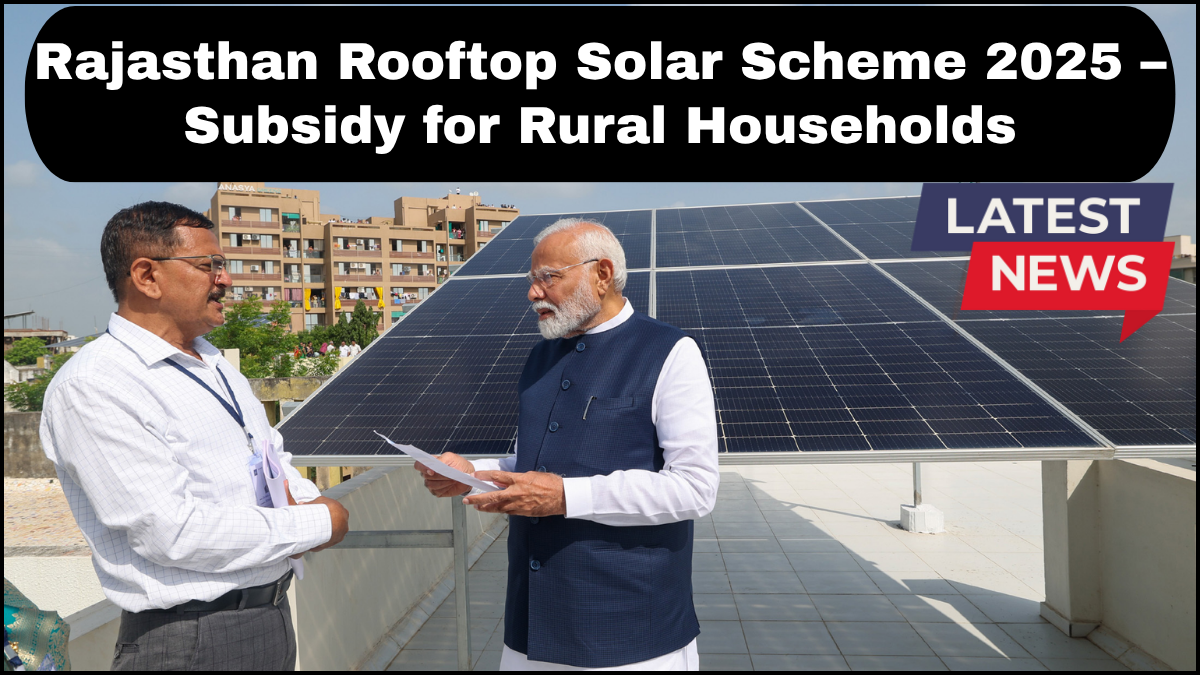The Rajasthan Rooftop Solar Scheme 2025 is a landmark initiative aimed at boosting clean energy adoption across rural communities. This scheme empowers rural households to install solar panels on their rooftops and significantly cut down on electricity expenses, all while contributing to India’s renewable energy goals. Backed by government subsidies and technical support, it stands as a transformative step toward sustainable rural development.

What Is the Rajasthan Rooftop Solar Scheme 2025?
Launched by the Government of Rajasthan in partnership with central renewable energy agencies, the Solar Rooftop Scheme Rajasthan focuses on making solar energy affordable and accessible in rural areas. It promotes grid-connected rooftop solar systems by offering direct subsidies to eligible households.
The goal is simple: shift dependency from fossil fuels to solar power, reduce household energy bills, and drive the broader renewable energy transition across the state.
Key Features of the Scheme
Financial Subsidy for Rural Households
Rural families installing rooftop solar systems under this scheme can avail a subsidy of up to 40% on the total cost for systems up to 3 kW capacity. For installations between 3 kW and 10 kW, a 20% subsidy is typically available. The subsidy amount is directly credited to the consumer’s bank account after approval.
Focus on Energy Access & Affordability
Many rural homes face inconsistent electricity supply. The scheme addresses this by enabling energy self-reliance through rooftop solar installations. Once installed, these systems can produce enough energy to cover a household’s daily needs, especially in sunny regions of Rajasthan.
Eligibility and Application Process
To benefit from the Rajasthan Rooftop Solar Scheme 2025, applicants must:
-
Be a resident of a rural area in Rajasthan
-
Own a residential property with sufficient roof space
-
Apply through the official government solar portal or designated DISCOM (Distribution Company)
Approved vendors will install the system after inspection, and performance-based monitoring will ensure long-term reliability.
Empowering Rural Rajasthan Through Renewable Energy
Rajasthan is already a solar-rich state, with vast potential for solar power generation. By extending the Renewable Energy Grant to the grassroots level, this scheme is encouraging rural households to become producers of energy rather than just consumers.
Moreover, solar energy systems reduce dependence on erratic grid supply and diesel generators, which are both costly and environmentally damaging.
Environmental and Economic Impact
Lower Carbon Footprint
By converting rooftops into solar energy hubs, thousands of rural households will reduce their greenhouse gas emissions, directly supporting India’s climate commitments under the Paris Agreement.
Reduced Electricity Bills
Solar energy drastically lowers monthly electricity expenses. In many cases, excess electricity generated during the day can be fed back into the grid, earning credits or monetary benefits for the household—a process known as net metering.
Job Creation in the Green Sector
The scheme also fuels local employment in solar panel manufacturing, system installation, maintenance, and technical support—creating green jobs in remote areas.
Challenges and Government Response
While the initiative has great promise, it also faces challenges such as:
-
Lack of awareness among rural populations
-
Limited technical literacy
-
Maintenance and servicing in remote areas
To address these, the Rajasthan government is conducting awareness campaigns, partnering with local NGOs, and training local technicians for timely support.
How to Apply for the Scheme
-
Visit the official portal of the Rajasthan Renewable Energy Corporation (RREC) or your local DISCOM.
-
Register with your household details and upload required documents.
-
Choose an empaneled vendor listed on the portal.
-
Once approved, installation will begin, followed by inspection.
-
After verification, the subsidy will be transferred to your account.
FAQs – Rajasthan Rooftop Solar Scheme 2025
Q1: Who is eligible for the Solar Rooftop Scheme in Rajasthan?
Any rural household in Rajasthan with a suitable roof for solar installation and legal property ownership can apply.
Q2: How much subsidy is provided?
Up to 40% subsidy is available for systems up to 3 kW, and 20% for systems between 3 kW to 10 kW.
Q3: Is there a cost after subsidy?
Yes, the remaining cost after applying the subsidy must be paid by the household. However, this investment often pays off within 5–7 years through savings.
Q4: Can I sell excess power to the grid?
Yes, through net metering, any excess electricity generated can be fed into the grid for compensation or energy credits.
Q5: Where can I apply?
Applications can be submitted via the official government solar portal or your nearest electricity distribution company (DISCOM) office.
click here to learn more